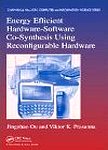版权所有:内蒙古大学图书馆 技术提供:维普资讯• 智图
内蒙古自治区呼和浩特市赛罕区大学西街235号 邮编: 010021

丛 书 名:Chapman & Hall/CRC Computer & Information Science Series
版本说明:1
I S B N:(纸本) 9781584887416
出 版 社:Chapman & Hall
出 版 年:2009年
主 题 词:Computers amp the Internet Computer Architecture
摘 要:Rapid energy estimation for energy efficient applications using field-programmable gate arrays (FPGAs) remains a challenging research topic. Energy dissipation and efficiency have prevented the widespread use of FPGA devices in embedded systems, where energy efficiency is a key performance metric. Helping overcome these challenges, Energy Efficient Hardware-Software Co-Synthesis Using Reconfigurable Hardware offers solutions for the development of energy efficient applications using *** book integrates various high-level abstractions for describing hardware and software platforms into a single, consistent application development framework, enabling users to construct, simulate, and debug systems. Based on these high-level concepts, it proposes an energy performance modeling technique to capture the energy dissipation behavior of both the reconfigurable hardware platform and the target applications running on it. The authors also present a dynamic programming-based algorithm to optimize the energy performance of an application running on a reconfigurable hardware platform. They then discuss an instruction-level energy estimation technique and a domain-specific modeling technique to provide rapid and fairly accurate energy estimation for hardware-software co-designs using reconfigurable hardware. The text concludes with example designs and illustrative examples that show how the proposed co-synthesis techniques lead to a significant amount of energy *** book explores the advantages of using reconfigurable hardware for application development and looks ahead to future research directions in the field. It outlines the range of aspects and steps that lead to an energy efficient hardware-software application synthesis using FPGAs.